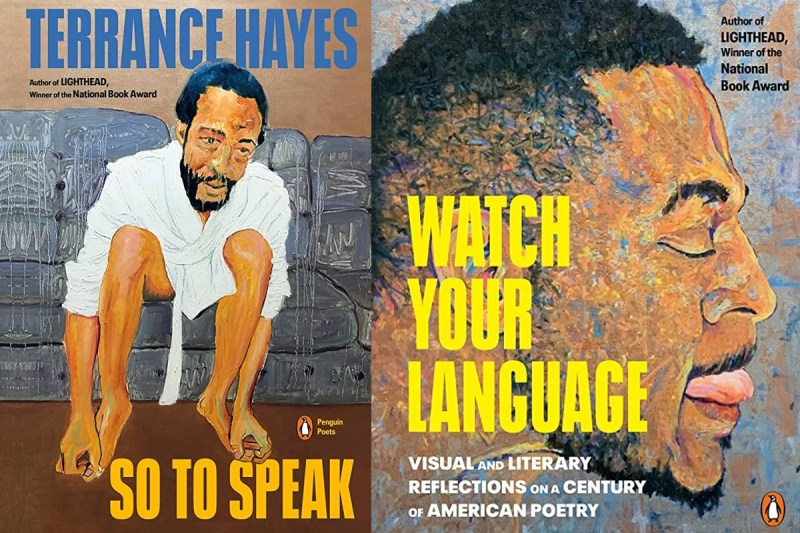There are plenty of great new books to read coming out over the summer, but few toy with the bewitching power of words quite so skillfully as poet Terrance Hayes. His dual releases So to Speak and Watch Your Language will make an emphatic mark on your summer. The former is a relatively straightforward collection of poetry (at least as straightforward as contemporary poetry can be – so barely straightforward at all); the latter a wild, experimental romp through the realm of critical analysis.
Recipient of the National Book Award for Poetry, the Pushcart Prize, and MacArthur and Guggenheim fellowships, Terrance Hayes is among the most esteemed poets working today, and his latest book releases reflect that preeminence. These are the works of a master of form and content, and indeed pushing the bounds of form is exactly what he set out to do with the sort of frustrated confidence that only comes from an artist par excellence.
So to Speak and Watch Your Language will be released side by side on July 25th, but you don’t have to worry about which to read first. Both stem thematically from a Toni Morrison quote extolling the need for a “map” to explore the “critical geography” of poetry in order to provide space for “intellectual adventure,” but either seems like a fine place to start that adventure.

So to Speak
It could be argued that So to Speak, the poetry collection, is the more approachable of the two books, so we’ll begin there.
A full-tilt exploration of language, the poems contained in So to Speak range from restrained to decadent, embittered to ecstatic. In one moment he’s guiding us through a playful fable, and in the next he’s gritting his teeth over the murder of George Floyd. All manner of characters populate its poetic landscape. Handymen who aren’t actually handy. A trans woman named Taffeta. A sly cat with a sharp sense of humor. Troubled parents. The “branch of the forest industry tasked with trimming branches.” Marvin Gaye, Octavia Butler, Prince, Lil Wayne, and even this guy: ¯_(ツ)_/¯
While the majority of the poems examine dire sociopolitical themes – with race in particular looming large – the poems are also peppered with humor. The resulting reading experience is as illuminating as it is enjoyable.

Watch Your Language
At a glance, you might think Watch Your Language: Visual and Literary Reflections on a Century of American Poetry will be some dry academic text. It’s anything but.
Poetry is almost inherently experimental, therefore So to Speak doesn’t strike me as experimental per se. It is, as you’d expect, a collection of poems spanning various formats. Watch Your Language, on the other hand, is a romp of experimentation into literary criticism that specifically sets out to break the mold.
The core goal – to explore the work of influential poets famous, forgotten, and ignored – is a fairly conventional intention, but the execution is anything but typical. Comprised of lists, essays, test prep questions (such as “You ever wonder why Missouri native T.S. Eliot spoke with a British accent?” or “If you write a poem like ‘Howl,’ do you really need to write anything else?” or “If you see suffering’s potential as art, is it art or suffering?”), doodles, tarot cards, even a board game. There simply has never been a work of criticism like it.
More than a mere opportunity to educate yourself on essential yet overlooked poets, as you read through Watch Your Language the ever-changing formats force you to consider the content differently than you would via straight prose. It’s like parkour for your brain, running your mind through a cognitive obstacle course that makes you look at the literary setting from a new vantage.
Is that its intention? I’m not sure and I don’t think it matters. What I do know is that Terrence Hayes’ new books make for delightful reading. Both deliver a pleasurable, thought-provoking linguistic experience, while Watch Your Language is the sort of oddball work that sits nicely on a shelf alongside strange literary artifacts like Buckminster Fuller’s I Seem to Be a Verb or Marshall McLuhan’s The Mechanical Bride.
The box was too small for Hayes’ words, so he punched his way out. Combined, these two books complement each other to deliver a truly singular read.
So to Speak
Watch Your Language



